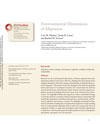-
An Environmental Migration Review and 6 Recommendations to Build Livelihood Resilience
January 20, 2016 By Haodan "Heather" Chen An article in the Annual Review of Sociology reviews much of the research on the relationship between environmental factors and migration, providing a timely overview of a complex field. “Migration is often a household strategy to diversify risk,” write Lori Hunter et al., but can be influenced by any number of determinants, including at the macro level (e.g., environmental, social, cultural, economic, and political dynamics), the meso level (e.g., intervening obstacles and facilitators), as well as the micro level (e.g., personal and household characteristics). Following dire predictions of hordes of environmental migrants in the 1990s, the authors see a broader realization among researchers that, first, migration is “not only determined by environmental factors;” and second, migration is “a form of environmental adaption, yet only one among many forms of adaption.” Despite progress demystifying “environmental refugees,” the authors point toward several suggestions for future research. Integrating environmental factors into mainstream migration theory is still a challenge, as are the lack of consideration of social theory and imprecise definitions of “migration” and “environment.”
An article in the Annual Review of Sociology reviews much of the research on the relationship between environmental factors and migration, providing a timely overview of a complex field. “Migration is often a household strategy to diversify risk,” write Lori Hunter et al., but can be influenced by any number of determinants, including at the macro level (e.g., environmental, social, cultural, economic, and political dynamics), the meso level (e.g., intervening obstacles and facilitators), as well as the micro level (e.g., personal and household characteristics). Following dire predictions of hordes of environmental migrants in the 1990s, the authors see a broader realization among researchers that, first, migration is “not only determined by environmental factors;” and second, migration is “a form of environmental adaption, yet only one among many forms of adaption.” Despite progress demystifying “environmental refugees,” the authors point toward several suggestions for future research. Integrating environmental factors into mainstream migration theory is still a challenge, as are the lack of consideration of social theory and imprecise definitions of “migration” and “environment.” As natural resource management and development efforts become increasingly intertwined, a working paper from the UN University and Resilience Academy provides six policy recommendations to improve livelihood resilience “in a changing world.” The authors write that livelihood resilience not only “makes people and their wellbeing the central focus [of development], underpinned by an emphasis on rights and justice,” but “relates to wider development processes that transform adaptive capacities and livelihood opportunities.” Based on this premise, the authors propose six recommendations on improving livelihood resilience to international policymakers, national government representatives, UN agencies, and other development actors. These include supporting those who cannot migrate when places become uninhabitable and building robust datasets and research methods to increase policy effectiveness.
As natural resource management and development efforts become increasingly intertwined, a working paper from the UN University and Resilience Academy provides six policy recommendations to improve livelihood resilience “in a changing world.” The authors write that livelihood resilience not only “makes people and their wellbeing the central focus [of development], underpinned by an emphasis on rights and justice,” but “relates to wider development processes that transform adaptive capacities and livelihood opportunities.” Based on this premise, the authors propose six recommendations on improving livelihood resilience to international policymakers, national government representatives, UN agencies, and other development actors. These include supporting those who cannot migrate when places become uninhabitable and building robust datasets and research methods to increase policy effectiveness.ECSP Director Roger-Mark De Souza is a member of the Resilience Academy.
Sources: Annual Review of Sociology, United Nations University.
 A Publication of the Stimson Center.
A Publication of the Stimson Center.





